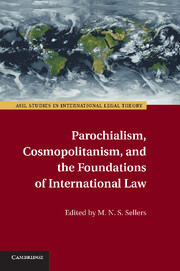Book contents
- Frontmatter
- Contents
- Notes on Contributors
- Preface
- 1 Introduction
- 2 Parochialism and the Legitimacy of International Law
- 3 Parochialism, Cosmopolitanism, and the Paradigms of International Law
- 4 Liberal Cosmopolitanism or Cosmopolitan Liberalism?
- 5 Are Human Rights Parochial?
- 6 The Parochial Foundations of Cosmopolitan Rights
- 7 Rights in Reverse
- 8 Parochial Restraints on Religious Liberty
- 9 Parochialism, Cosmopolitanism, and Justice
- Index
- References
4 - Liberal Cosmopolitanism or Cosmopolitan Liberalism?
Published online by Cambridge University Press: 05 December 2011
- Frontmatter
- Contents
- Notes on Contributors
- Preface
- 1 Introduction
- 2 Parochialism and the Legitimacy of International Law
- 3 Parochialism, Cosmopolitanism, and the Paradigms of International Law
- 4 Liberal Cosmopolitanism or Cosmopolitan Liberalism?
- 5 Are Human Rights Parochial?
- 6 The Parochial Foundations of Cosmopolitan Rights
- 7 Rights in Reverse
- 8 Parochial Restraints on Religious Liberty
- 9 Parochialism, Cosmopolitanism, and Justice
- Index
- References
Summary
Since the 1990s there has been a notable surge of interest in the subject of cosmopolitanism in a variety of disciplines, from philosophy, literary theory, and cultural studies; to political theory and international relations; to most recently international law. Variously influenced by the accretion of meanings and associations, the term has acquired over the years since its coinage in fourth-century b.c.e. Greece, drawing much of its inspiration from the work of Kant on cosmopolitanism and informed by Rawls's thought on distributive justice, the resulting literature has proved rich and diverse and curiously contradictory. There is no single common understanding of cosmopolitanism, and consequently there is wide disagreement among the new cosmopolitanists as to its specific social, political, and legal implications. The term has been used to promote a wide range of projects, from a radical form of global redistribution to alleviate poverty in the Third World to military intervention in nonliberal states. It has been used to account for the emergence of the so-called global civil society with its new forms of governance on the one hand, and to describe the unique character of the European Union's legal and institutional structures on the other. Despite this diversity and the apparent malleability of the concept, it is nonetheless possible to make some general statements about the ethics, geography, and attitude that are distinctive to cosmopolitanism and that, to one degree or another, underlie all modern cosmopolitanist projects.
Cosmopolitanism, I posit in this chapter, is first premised on a claim concerning the meaning and scope of community.
- Type
- Chapter
- Information
- Publisher: Cambridge University PressPrint publication year: 2011
References
- 1
- Cited by



